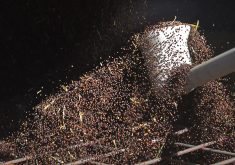We keep hoping this present worldwide binge of protectionism, geo-political bullying and bad-will will fade, subside and JUST GO AWAY!
But if it doesn’t, what does Canada do? How do Canadian farmers adapt to that fact? It’s like with climate change: We hope it can be stopped, but if it can’t be, what do we do? How do we adapt?
Some smart Canadians are starting to think about that, as protracted disputes with China and India show no signs of disappearing, as the U.S. Trump administration remains a continuing risk for sudden trade actions and as the European Union shows few signs of honouring the spirit of the Canada-EU trade deal.
Read Also

Finding the sweet spot where ag science meets ag culture
Soon, many will look at practices such as seeding marginal acres to forage, growing cover crops and livestock integration and ask why they didn’t do this sooner.
One of Canada’s best agricultural economics analysis outfits is Agri-Food Economic Systems of Guelph, run by Al Mussell, who has often been quoted by me and by this newspaper. He and his colleagues just took a look at the question of what it means for Canada if the rules-based, free-trading era of the past 25 years has ended, and how Canada should adapt. You can look at it here. Next week you’ll also be able to read in this newspaper a story and a column by me and a couple by a colleague on Agri-Food’s report.
In this space today, I’m going to suggest the way I think Canada could both adapt to the new environment of power-politics in trade with the big players, while holding on to the gains of the “rules-based international order” that Canada has been a champion of, that our farmers have built a world-class export industry to serve, and which isn’t something that should be casually abandoned.
Canada should follow a two-track strategy. 1) It should work to build trade deals, agreements and institutions with likeminded countries. 2) It should push back at countries that have abandoned a rules-based approach rather than pretending they’re still inside the free trade tent.
With likeminded nations, which include members of the Trans Pacific Partnership, the U.S. (when Donald Trump is in a good mood or not needing a political distraction), a potential no-deal Brexit U.K., and assorted nations across Asia, Africa and the Americas, Canada should just keep going along the path of ever-wider market access secured by trade deals. Other than the U.S., these nations aren’t so powerful they can dictate the rules of trade to the rest of the world, so they will probably want to keep going along the rules-following, open markets course. Under Trump the U.S. has seemed less reliably supportive of free trade, but the country itself at least ideologically agrees with liberal economics, and Trump revealed in the NAFTA renegotiations that he was mostly looking for symbolic victories in a tweaked deal. Trump’s and the U.S.’s real bones to pick are with China and the European Union, which haven’t honoured the spirit of free trade for decades. There’s no reason right now to believe that other middle-sized and trade-friendly countries won’t continue to want to keep going down the pro-trade river.
With those who have decided to breach trade agreements and use their relative power to play trade and political games with Canada, Canada should push back and make sure costs accrue to them too. Even if Canada suffers more and can’t hope to independently break the behaviour of these trade malefactors, playing meek with them hasn’t worked, and nothing works better against most bullies than giving them a bloody nose or a black eye. There’s got to be a cost to bad behaviour. If likeminded nations do likewise, some gains could be made.
It’s a pretty simple strategy, right?
The question of how to protect farmers’ and Canada’s best interests in this volatile new world order is going to engage all sorts of Canadians in coming years. The above are my present suggestions. What are yours? It’s something we’ve got to start thinking about.
















